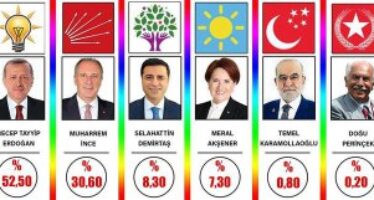Syrian dialogue: a bullet in the head
![]()
- Simple demands have been met with doublespeak and duplicity.About the authorThe author is a blogger and human rights activist from the Middle East, writing in Arabic and English.
“A group of independent activists, intellectuals, and ex-PMs have gathered in Damascus to discuss the future of Syria in the light of the recent demonstrations” [Syrian government television], however, “two activists were beaten and dragged out of the conference hall as they oppose the regime” [AlArabia satellite channel].
The above two headlines were broadcasted on the same day describing the same event. What was shown on the first channel was a peaceful open meeting where people exchanged ideas and “drew” a route map for the future, while the other channel clearly showed the deep crisis in which the regime in Syria lies.
Day after day, the number of people who have stopped believing the official statements is increasing: the Syrian regime threw its last card away with the military intervention in Hama, the city which has witnessed the largest demonstrations since the beginning of the Syrian popular movement on March 15. In the last Hama demonstration there were more than 400,000 people in Assi Square, in the complete and suspicious absence of security forces and their allies, theAlshabbeeha in local parlance. No injury or attacks were reported. This semi-organized and completely peaceful demonstration prompted the regime to remove the governor and perpetrate a mass military intervention, apparently by proving that the people have the political consciousness to protest without causing damage or vandalism. The people of Hama carry horrible memories of the 1982 massacres, which resulted in massive destruction and the killing and kidnapping of more than 35,000 people. Today, the regime still believes that there is only one way to deal with public unrest: aggressive violence.
Away from the streets, a few groups have started to appear, under the surface,comprised of opposition leaders and activists. They choose to meet either publicly in hotels and conference halls or under cover in houses and old streets. Every group has its own vision and own analysis of the current situation. After 50 years of oppression, the Syrian people have lost all the means by which they can meet, discuss, form groups, and understand politics. However, the recent population-wide movements have revealed the hidden capabilities within their minds and souls. The people who are going into the streets to challenge the security forces as a mass have really decided that they have nothing to lose. Indeed, after decades of humiliation and corruption, people on the streets see that there will be no return to the past, saying clearly: “we may die, but no more”.
After more than 150 days of protests, we have discovered that the regime does not want to solve any issue. The regime still believes that deploying the security forces is the only possible solution to the country’s problems. The army tanks are heading to Deir Ezzor [500 km north-east Damascus], the second largest city which witnessed massive demonstrations that reached the governor himself. Since the declaration of the so-called “dialogue initiative” by President Alassad, no effective actions have been taken to put things on track. Every time the regime announces a reform, the police and security forces kill more people. There were always simple and direct steps that the regime could have taken, but people started to see that all promises werebeing postponed indefinitely. In Syria, it is well known that when you want to kill an issue just assign a committee to it! Rather, President Alassad could simply have announced the cancellation of the infamous Article 8 of the constitution, which states that “the Baath Party is the only leader for the country and people”. It is the Baath Party which has destroyed the Syrian economy and whose leaders have collected billions of dollars through decades of corruption, so this simple action would have resolved much of the conflict.
After political reform comes the issue of justice. Since the beginning of the people’s movement, no trial has taken place of any person responsible for the state’s violence. The maximum action has been the removal of the governors of both Dara’a[100 km south Damascus] and Homs [160 km north Damascus]. Additionally, the removal of the governor of Hama was not welcomed by the majority of the population since he played a positive role mediating between the protestors and security forces. All those officers who gave orders to open fire on the protestors should be tried publicly, even from the pragmatic perspective that it would absorb the anger on the streets, and show the relatives of those killed that the government does “care”.
People’s demands are simple: freedom of expression and an end to corruption, to allow for economic development towards a better life. Syrians would never have asked for the removal of Bashar Alassad if they had seen immediate action: it was the very slow and arrogant reaction from the authorities that raised the height of the demands, and convinced people not to accept less than regime change.
The coming months will be hard for Syria and the Syrians. When a regime says dialogue and means violence, nothing is predictable.
Related Articles
Libya: The real war starts now
![]()
THE ROVING EYE By Pepe Escobar Enough about The Big G’s downfall. Now comes the real nitty-gritty; Afghanistan 2.0, Iraq
Hundreds held in anti-Wall Street protest
![]()
Witnesses describe chaotic scenes on New York’s Brooklyn Bridge as police officers surround and handcuff demonstratorsNew York City police said



